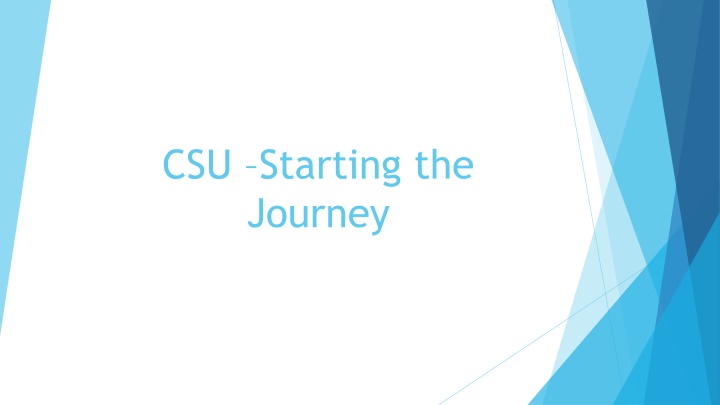Innovative Crisis Stabilization Center in Charleston: Transforming Mental Health Care
The Tri-County Crisis Stabilization Center (TCSC) in Charleston offers round-the-clock services for individuals in psychiatric distress. With a focus on diversion from emergency departments, hospitals, and jails, the center provides comprehensive care by a team of skilled clinicians, nurses, and psychiatrists. The facility operates 24/7, offering therapy, assessments, medications, and peer support. With a startup budget of $1.4 million, the center has proven to be a critical location in providing timely and effective mental health services.
Download Presentation

Please find below an Image/Link to download the presentation.
The content on the website is provided AS IS for your information and personal use only. It may not be sold, licensed, or shared on other websites without obtaining consent from the author.If you encounter any issues during the download, it is possible that the publisher has removed the file from their server.
You are allowed to download the files provided on this website for personal or commercial use, subject to the condition that they are used lawfully. All files are the property of their respective owners.
The content on the website is provided AS IS for your information and personal use only. It may not be sold, licensed, or shared on other websites without obtaining consent from the author.
E N D
Presentation Transcript
CSU Starting the Journey
Determine Model True CSU is 24/7 with max stay of 23 hours and 59 minutes Spartanburg Model CRCF- Ability to stay for multiple days Charleston Dorchester Model Other models as well AZ model of Urgent Care - Mind 24-7 Serve everyone that walk through the door. Other Models
Tri-County Crisis Stabilization Center (TCSC) Charleston Dorchester Mental Health Center Reopened June 2017
An ED, Hospital, Jail Diversion Program Appropriate level of care at the appropriate time by the appropriate staff; therefore: Clinically appropriate emergency department (ED) diversion Clinically appropriate inpatient hospital diversion Legally appropriate jail diversion and triage option for law enforcement Clinically and legally appropriate shortened length of stay (LOS) in ED, inpatient bed, jail Option for stepdown/transfer from inpatient hospital or transfer from Sobering Center (soon to be opened next door)
Hours, services, staff: Open 24/7 every day of the year Housed in the Charleston Center building (DAODAS) to help link patients to treatment to Substance Use Disorders, when needed Adjacent to the Sobering Center (soon to be open) Staffed with Master s prepared clinicians, Bachelor s level clinicians, Registered Nurses, and Psychiatrists (to include PRN staff) Patients are supported with group therapy, individual therapy, mental health assessments, psychiatric medical assessment, medications (If needed), PRS, Peer Support, entitlements, and nursing services. 24/7 Sheriff s Deputy on site
CDMHC reopened TCSC on June 5, 2017. Startup budget approximately $1,406,000.00. Recurring budget approx. 1.5 mil. 24/7, 10 bed unit housed in Charleston Center (DAODAS) . critical location. Licensed as CRCF by SCDHEC not a locked unit. Criteria 18+, voluntary, medically stable, in psychiatric distress, not violent, not intoxicated, able to participate in rigorous treatment regime. The function ED diversion, hospital diversion, jail diversion, triage service for law enforcement Staffing minimum of 5 on day shift, 2 on evening and 2 on night shift. RN on every shift. No less than BS/BA staff. Psychiatrist on site 3 hours 7 days a week and on call 24/7. 16 staff total + PRN staff. Crisis intervention, de- escalation, and assessment training critical.
TCSC Stats (June 5, 2017- February 1, 2022) 2497 - Referrals DIVERSIONS 1549 - Admissions 38 Jail 185- Law Enforcement Triage calls 962 - MH inpatient hospital 2.76 days - Average LOS 472 ED & hospital 4.18 Avg. census Diversions from Admissions July 2018-Current Month Primary MH concern 48, 2% SI 31, 1% 28, 1%14, 1%14, 0% 25, 2% 54, 4% 93, 3% 9, 0% Psychosis 77, 3% ED diversions 112, 4% Depression Hosp diversions 248, 18% Back to ED Other 309, 11% Hospitalized SI/HI 1645, 56% 1045, 76% 538, 18% Hosp stepdown Anxiety Mania
4, 0% Payor Source Treatment disposition 19, 1% 30, 2% CDMHC Self Pay 22, 1% 9, 1% 27, 1%24, 1%33, 1% 37, 2% AMA, Tx follow up unknown 62, 3% Medicaid/Medicare 41, 3% 111, 5% Other 66, 4% Select Health Private Outpatient Provider 57, 3% Medicaid (Fee for Service) Medicare 105, 5% BMHC 63, 4% 128, 6% Involuntary Inpatient Private Ins. 781, 48% 116, 5% Back to referral ED 154, 9% 1331, 60% ATC 151, 7% Chas Center Outpatient Molina 146, 6% Chas Center Inpatient/Detox Blue Choice Other MHC 362, 22% Wellcare MUSC Outpatient Healthy Blue Voluntary inpatient VA
Time of referral Day of week referred 368, 13% Day shift (7am - 3pm) 312, 10% Mon Tue Wed Thu Fri Sat Sun 552, 19% 285, 10% Evening shift (3pm - 11pm) 875, 30% 1652, 57% 448, 15% 470, 16% Overnight shift (11pm - 7am) 455, 15% 436, 15% Reason for denial to unit Referral source summary 4, 1% 1, 0% Intoxicated/needs medical detox Recent violence 15, 1% 28, 1% 72, 2% 2, 0% 41, 8% 21, 1% ED 141, 5% 15, 3% Not medically stable MH Center 14, 3% Inappropriate for voluntary admission Other 191, 6% Law enforcement 122, 22% 51, 9% MH Hospital Only in need of housing 541, 18% Self/family At cap for appropriate room sharing options Cannot perform ADLs 92, 17% 1940, 66% Charleston Ctr At capacity/full 128, 23% One80 Place 78, 14% Not ambulatory Other category No psychiatric diagnosis
Current Changes to TCSC Hospital Funding Per Diem 500/day up to 4 days, then further approval in 2 day increments from referring hospital up to 14 days Pros: More likely to get hospitals on board, b/c the risk is on SCDMH Cons: For SCDMH, this is a big risk with no guaranteed funding to the unit. (CDMHC only changed to this after hx of usage to streamline costs per hospital). No financial risk for hospitals (pay as you play) Better access to community To open a CSU, per diem funding would not work to create an initial opening budget. The risk needs to be on the community as it is a community issue. Increased access/usage should increase the average daily census Transparency with stakeholders: quarterly financial and data reviews























